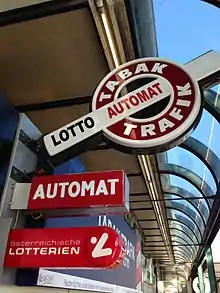Tobacconist
A tobacconist, also called a tobacco shop, a tobacconist's shop or a smoke shop, is a retailer of tobacco products in various forms and the related accoutrements, such as pipes, lighters, matches, pipe cleaners, and pipe tampers. More specialized retailers might sell ashtrays, humidification devices, hygrometers, humidors, cigar cutters, and more. Books and magazines, especially ones related to tobacco are commonly offered. Items irrelevant to tobacco such as puzzles, games, figurines, hip flasks, walking sticks, and confectionery are sometimes sold.
| Part of a series on |
| Tobacco |
|---|
 |
| History |
| Chemistry |
| Biology |
| Personal and social effects |
| Production |
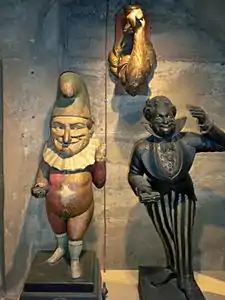
.jpg.webp)
In the United States, a tobacconist shop is traditionally represented by a wooden Indian positioned nearby. Most retailers of tobacco sell other types of product; today supermarkets, in many countries with a special counter, are usually the main sellers of the common brands of cigarette.
In the United Kingdom, a common combination in small corner shops has been a newsagent selling newspapers and magazines, as well as confectionery and tobacco. In UK marketing and retailing this sector is referred to as "CONTOB" ("confectionery and tobacco").[1]
A Tabac is a shop licensed to sell tobacco products in France and Spain. Tabacs also sell newspapers, telephone cards, postage stamps and multi-journey bus tickets.[2]
About
Specialist tobacconists are in theory educated and practiced in all things related to tobacco including its different forms, colors, scents, textures and tastes. They employ this knowledge to provide information regarding customers about the tobacco products. Due to the decline in the tobacco industry in recent decades and widespread use of mass-produced tobacco products, tobacconists have become scarce, though many smokers still prefer to buy their products from a tobacco shop with a tobacconist behind the counter.[3]
Standard tobacco shops in the United States generally specialize in cigarettes, roll-your-own supplies, smokeless tobacco such as nasal snuff, dipping tobacco and chewing tobacco, as well as cigars, and pipe tobacco. More recently, these smoke shops may also carry vaping supplies, and some may also double as head shops.
More upscale tobacco shops tend to have a much larger emphasis on cigars and pipe tobacco. Many of these establishments will have a walk-in humidor, as well as a smoking lounge or even a bar. These stores, often categorizing themselves specifically as a cigar store generally have limited amounts of the other commonplace forms of tobacco. Tobacco stores in Australia are normally franchised stores these days, as privately owned tobacconists generally don't or won't comply with the big tobacco companies. Then there are now smaller online tobacconists calling themselves Boutique Online Stores these stores are 24 hour operated stores, these stores are more specialized with emphasis on service and knowledge.
In countries where tobacco control laws are strong, tobacconists may have their trade limited. In the United States, it is common for retail pharmacies to sell cigarettes and similar products on the same premises as over-the-counter drugs and prescription medication. Campaigners in the USA advocate the removal of tobacco from pharmacies due to the health risks associated with smoking and the apparent contradiction of selling cigarettes alongside smoking cessation products and asthma medication. Pharmaceutical retailers counter this argument by reasoning that by selling tobacco, they are more readily able to offer to customers advice and products for quitting smoking.[4]
Regulations
Some tobacco shop owners in the US are concerned about the 2016 Food and Drug Administration (FDA) regulations for electronic cigarettes.[5] The 2010 FDA regulations caused some inconveniences for local tobacco shops in Cullman, Alabama, US.[6] The US Family Smoking Prevention and Tobacco Control Act, has restricted marketing, particularly to minors; prohibited flavored cigarettes (excluding menthol); removed descriptions including "light," "mild," and "low-tar" from cigarette packs; and made larger the dimensions of warning labels on smokeless tobacco.[6] Anyone under the age of 19 are not allowed entry to any US self-service tobacco shop, even if going with an adult.[6]
Uses in art
The Tobacconist, Victorian Walk is a featured exhibit at the Museum of London. It showcases shops in an effort to recreate the late 19th century.
Gallery
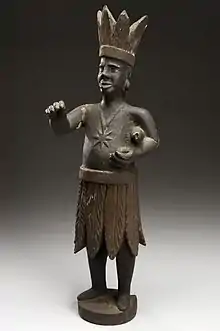
 18th-century advertising figure for a British tobacconist
18th-century advertising figure for a British tobacconist An advertisement for a tobacconist from the almanac of La Chronique de Jersey, 1892
An advertisement for a tobacconist from the almanac of La Chronique de Jersey, 1892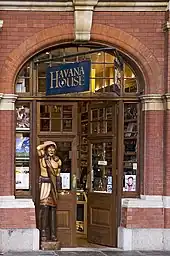 Modern tobacconist in Windsor, UK
Modern tobacconist in Windsor, UK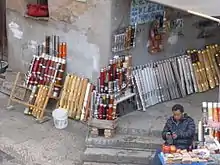
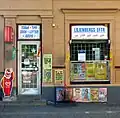 Tobacco shop in Varberg, Sweden
Tobacco shop in Varberg, Sweden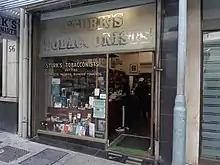 Sturk's Tobacconists in Cape Town, South Africa
Sturk's Tobacconists in Cape Town, South Africa
See also
References
- Yadin, Daniel, The International Dictionary of Marketing, p.58, 2002, Kogan Page, ISBN 0749435321 (not entirely accurate; the hyphen is not usual)
- "Why the tabac is essential to life in France – even if you don't smoke". The Local France. 15 April 2022. Retrieved 16 September 2022.
- "Tobacconist: Inside Job". Inside Jobs. Retrieved 10 February 2013.
- "Tobacco-Free Pharmacies". Americans for Nonsmokers' Rights. Archived from the original on 22 May 2010. Retrieved 18 July 2013.
- Emily Fannon (10 May 2016). "New E-Cig Regulations Could Close Shops". MyStateline.com. Nexstar Broadcasting Group.
- Trent Moore (9 July 2010). "New FDA regulations affecting tobacco shops". The Cullman Times. Nexstar Broadcasting Group.
